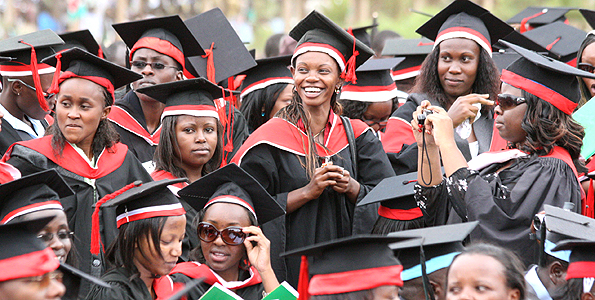I wanted to write a damning indictment of the state of higher education in Kenya, but thanks to the BBC World Service, I realized that the Kenya is not the only sub-Saharan African country that has its higher education in limbo. I will start with the state of higher education in Kenya, because I have been through the system experienced it and I know its shortcomings.
Higher education in Kenya is deplorable, saying so would be an understatement. Makes me wonder, why we all labored so hard while in high school to get ourselves to university. When I was in high-school, about 10,000 students of around 250,000 students transited into university each year. Back then getting to university was a matter of life and death, the demarcation between a future of poverty and a future of riches, between a pauper’s life and upper middle class suburbia. At the moment around 50,000 students of around 350,000 students transit into university, the improving odds of public university entry have come at the cost of worsening standards and quality of education.
Two derisory terms have come to refer to Kenya’s massively disappointing University graduates; one, ‘half baked graduates’ and two, ‘everything paper graduates’. The first term refers exclusively to Kenyan graduates who leave college with little or no skills, no technical ability and are certainly of no value to employers. Half baked graduates are a real thorn on the country’s economy; they force employers to incur millions of losses in employee training. The ‘everything paper graduate’ is your quintessential sciences graduate from a public Kenyan University. They are very good on paper, and good on talk to, but talk is cheap. An everything paper engineering graduate will be very good at engineering mathematics, will be brilliant at solving algorithms but will be very poor at empirical engineering that solves real life’s everyday problems; machines, structures and solutions that work.
Where thou art lays the problem with our higher education? Our higher education seems pre-occupied with trivialities that serve the continent no better. We seem to inculcate a culture of education acquisitiveness that serves not the continent’s development needs. Last month for example I went out to buy an external battery charger for my cell phone; I took keen interest in the packaging which I must say was very poor and the user instructions were done in particularly poor grammar and myriads of spelling mistakes, that notwithstanding, the charger worked quite well. It struck me that the manufacturers of the charger were more pre-occupied with producing a charger that worked rather than the nitty-gritties of packaging.
I doubt our education systems are geared towards giving students skills to build things that work. The debate in Kenya has always been, whether to overhaul the education system, whether to model our education system on; the US, Britain, Canada, or Singapore system. How many years of primary education should we have in Kenya? Should we give our students laptops in primary schools? These are some of the trivial questions that seem to pre-occupy.
I have however always held that it is the philosophy of our education that we never addressed. We never asked ourselves, education for what? When I went to university, my lecturers never quite forgot to remind us how universities were supposed to be premier institutions for research and training, research and training I saw very little of in my four years in college.
Our problems stem almost entirely from modeling our education on the western systems rather than developing custom education solutions for our development need. We are hell bent on mastering Shakespeare, Dumas and Locke rather than producing Shakespeare and Dumas. We have created a culture of consuming knowledge rather than producing knowledge. Students in Africa are not taught to think critically, to develop grand theories rather than master grand theories.
Although the system is hell bent on producing very poor students, graduates of higher education are not without blame. Why, why don’t they for the love of the universe and on realizing that they are receiving very little education, don’t they take time to educate themselves. Many a time I have had conversations with this so called graduates of Kenyan varsities and I have ended feeling ashamed for them, feeling ashamed at their shallowness of knowledge base and character, feeling ashamed at their very local world view. Why on earth did they, not take time to educate themselves?
For us to have an education system that works for us, we need to cut this bud that infatuates us certificates, PhDs third degrees and so on. We need to realize that technical education and low level skills are as critical in national development as university degrees are. We need to privatize our universities, have them have functional research departments rather than have research as an aspiration. We also have to realize that education must not necessarily be westernized for it to meet the standards, South Korea, Japan and other Far East Asian countries have managed to become technology and manufacturing leaders in the world without aping western education.



